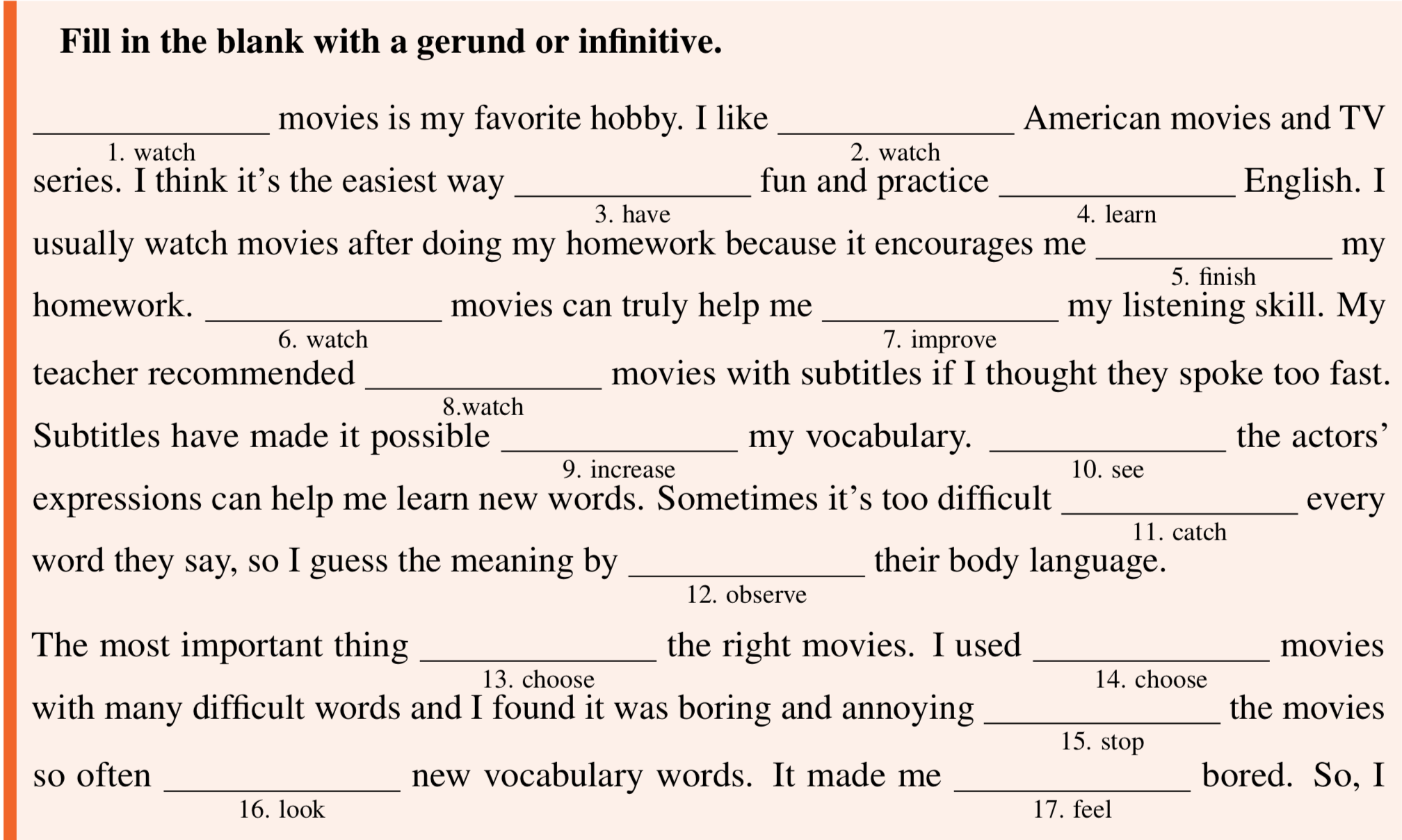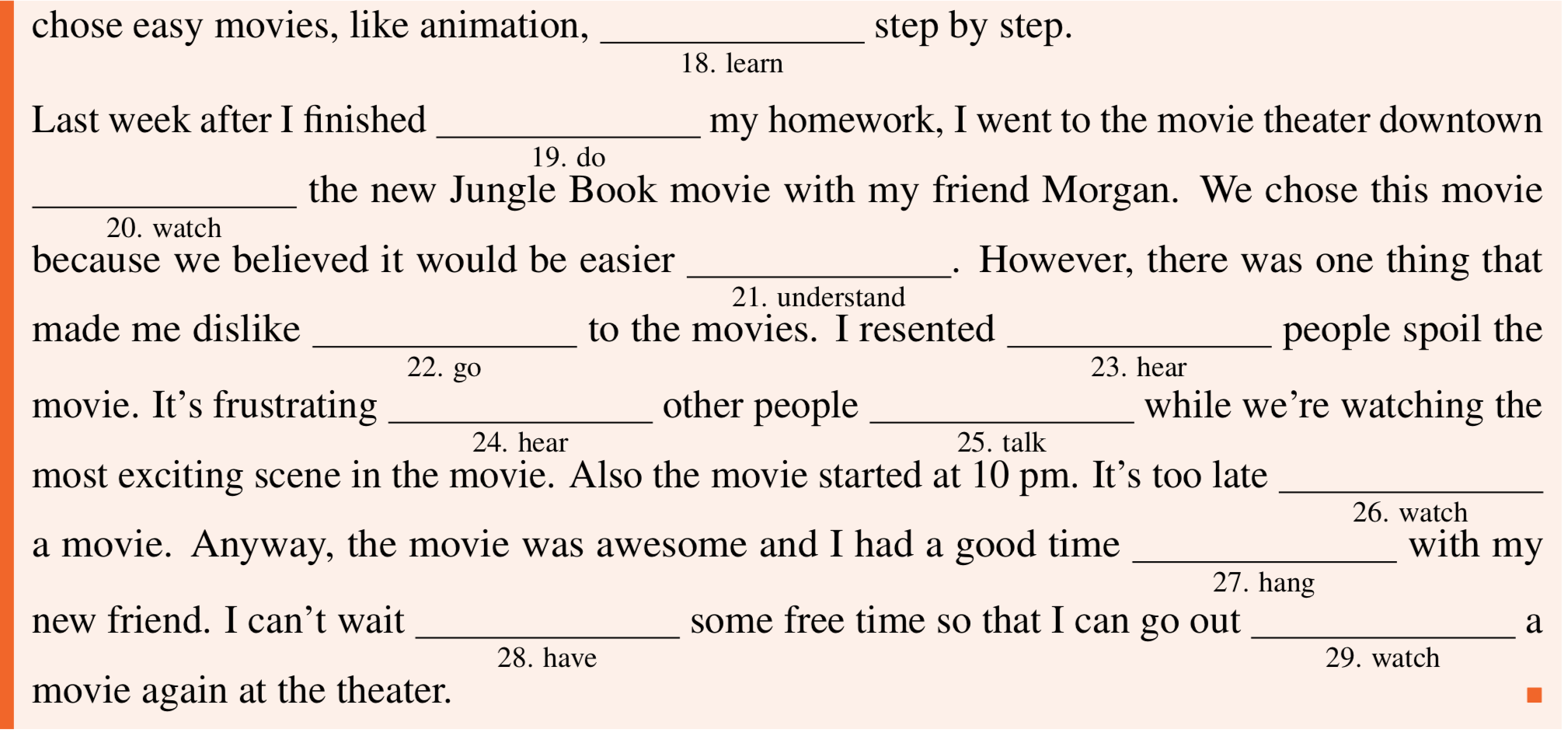Writing and Grammar Skills Appendix
Gerunds
Gerunds are formed by adding “ing” to a verb to make it function as a noun. The following are ways gerunds are used.
- As the subject of a sentence:
- Swimming is my hobby.
- Consuming fast food contributes to higher obesity rates.
- Swimming in the lake in the summer is my favorite summertime activity.
- As the object of a verb, depending on the verb. The action of the gerund in this situation usually happens before or at the same time as the main verb:
- I can’t stop eating chocolate.
- I don’t recall allowing you into this room.
- After a pronoun/person as an object, depending on the verb, and in formal situations, a possessive noun or pronoun may be used:
- I enjoy Ms. Chitty(‘s) playing the guitar.
- I don’t appreciate their being rude.
- Some special verb phrases require a gerund:
- You should spend some time studying every day.
- She had difficulty studying with all the noise in the library.
- Prepositions cannot have a verb after them, so change the action to a gerund:
- I am afraid of flying.
- My sister isn’t interested in trying to learn how to use a computer.
- Sense verbs “see”, “smell”, and “hear” can use base form verbs, but they usually have a gerund after them:
- I heard a little girl crying at the playground.
This website gives good word lists for the previous gerund rules.
Infinitive
Infinitives are formed by adding “to” before a verb to make the phrase function as a noun. Be careful as “to” can also be a preposition, and thus a gerund form of a verb must be used after. The following are ways infinitives are used.
- As the subject of a sentence, but it is not common.
- To be or not to be–that is the question.
- As the object of a verb, depending on the verb. The action of the infinitive in this situation usually happens after the main verb:
- I want to go to UT next year.
- I plan to visit Turkey next month.
- Can be used after a pronoun/person as an object, depending on the verb: Ex I want my students to go to UT next year.
- Bob advised his brother not to buy stock in Apple.
- To show purpose, reason for an action (same as“in order to”, but“in order”is deleted:
- I walked to Panera to get some coffee.
- Note: The preposition “for” can also be used to show purpose, but usually the purpose is for some thing. Use infinitive if the purpose is an action, and use “for” if the purpose is a thing.
- I walked to Panera for some coffee.
- Note: The preposition “for” can also be used to show purpose, but usually the purpose is for some thing. Use infinitive if the purpose is an action, and use “for” if the purpose is a thing.
- I walked to Panera to get some coffee.
- With some adjectives to describe someone’s feelings:
- I was surprised to see Ms. Smith in her Halloween costume.
- I’m sorry to see you go.
- Causative verbs “let”, “make”, and “have”, and usually the verb “help” do not use “to” with the infinitive—just the base form verb:
- I let Claudia braid my hair.
- Linda was too lazy, so she had someone else write her essay.
- Unfortunately, I was the one who helped her write it.
- Note: The meaning of “let” and “make” are very different here. “Let” has a meaning of permission, allowing someone to do something, while “make” means to force someone to do something. How are the following example sentences different in meaning?
- I let Claudia braid my hair.
- I made Claudia braid my hair.
- Note: The meaning of “let” and “make” are very different here. “Let” has a meaning of permission, allowing someone to do something, while “make” means to force someone to do something. How are the following example sentences different in meaning?
- “it + be verb + adj. (for someone) + inf.”
- It is a good day to go outside.
- It is not easy for students to learn English.
- “too + adj. + inf.”:
- It is too cold to go outside today.
- She’s too beautiful to go to jail.
- “adj. + enough + inf.”:
- It’s not warm enough to go outside.
- The chicken isn’t done enough to eat yet.
- “enough + noun + inf.”:
- I don’t have enough money to go to the mall this weekend.
- Brian did not have enough points to pass the test.
- I don’t have enough money to go to the mall this weekend.
This website gives good word lists for the previous infinitive rules.
Gerund or Infinitive?

One of the most difficult aspects of using gerunds or infinitives is when they are used after a verb. As the chart explains, some verbs require either a gerund or infinitive after them. You could just memorize which verbs need a gerund and which need an infinitive, or you could use the loose rule pictured here.
This rule doesn’t always work, but it’s better than just memorizing a list of verbs. These especially can be useful for verbs where both a gerund or infinitive may be used, but it can change the meaning. Let’s look at an example of that.
- I stopped smoking.
- I stopped to smoke.
These two sentences have different meanings. We can break down the sentences into two actions– although only one of them is a verb. If one happens before the verb, in the past, most of the time you will need a gerund.
- I stopped smoking. (I smoked in the past, but then I stopped.)
In this example, the person first smoked, but then the later action was to stop. The first action was completed and finished before the verb happened.
- I stopped to smoke. (I stopped first, and then started to smoke.)
As you can see from the two examples, oftentimes gerunds are the first action before the verb, but infinitives happen after the verb. Let’s look at some other examples.
- I enjoy playing tennis. (Gerunds can also mean at the same time. You usually have fun and enjoy something while you do that activity.)
- I want to talk to you. (You want now the future activity of talking to someone. This action has not been started yet, and hopefully will occur in the future.)
- I miss talking to my friends in my country. (I talked to my friends in my country before, and now I miss that.)
- I don’t remember locking my door! (You may or may not have locked the door before you left, and just now you thought about that.)
- Don’t forget to turn the oven off. (Hopefully you remember you need to turn the oven off and then do so.)
- I decided to go to the US to study English. (First you made a decision, and that will be realized in the future.)
Let’s practice using this rule to guess if we need a gerund or infinitive in the following sentences.


Practice 2
Make your own sentences using the sentence beginners. Do you need to use a gerund or infinitive? Try to write your sentences about your hobbies.
- I have a difficult time_____________________________________________________ .
- I waste a lot of time______________________________________________________ .
- On the weekend I often lie on my bed_____________________________________ .
- In my free time, I like to __________________________________________________ .
- I promise ________________________________________________________________ .
- I would like ______________________________________________________________ .
- I can’t stand _____________________________________________________________ .
- It is a bad idea ___________________________________________________________ .
- It takes patience _________________________________________________________ .
- It is dangerous ___________________________________________________________ .
- I am ashamed ____________________________________________________________ .
- I am determined __________________________________________________________ .
- I am relieved _____________________________________________________________ .
- It’s too easy ______________________________________________________________ .
- I am not strong enough ___________________________________________________ .
- I don’t have enough money _______________________________________________ .
